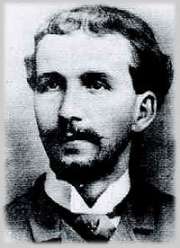|
Биография José Asunción Silva
Nascut la Bogota, oras in care s-a si sinucis in 1896, Jose Asuncion Silva are o biografie plina de neprevazut si contardictii.
Jurnalist, afacerist- falimentand afacerile de familie, secretar de legatie, sunt cateva repere din biografia poetului, caruia marea i-a inghit manuscrise, cu ocazia naufragiului vaporului Amerique, petrecut in 1895.
Engleză
José Asunción Silva (November 27, 1865 in Bogotá – May 23, 1896 in Bogotá) was a Colombian poet. He is considered one of the founders of Spanish-American Modernism.
Born into a wealthy and cultured Bogotá family, Silva led a carefree life, traveling to England, Switzerland, and France in his early adulthood. However, with the death of his father and the increasing financial struggles his family experienced thereafter, Silva was forced to return to Colombia. Incapable of paying his family's enormous debts, Silva accepted a diplomatic position in Caracas. While there, he was encouraged by fellow writers to pursue his poetry.
In 1895, Silva's only major work of prose was lost in a shipwreck. He was, however, convinced to rewrite the novel from memory. In 1896, his beloved sister Elvira died. Under the weight of these two events, Silva collapsed and committed suicide on May 23, 1896.
He wrote his first work, "Primera Comunión," in 1875.
Traveling to Europe, he met Stéphane Mallarmé and Gustave Moreau in Paris.
On May 23, 1896, at about 11:00 at night, Silva said goodbye to the friends with whom he would talk in tertulias--daily social gatherings--and gave his mother and sister Julia a kiss goodnight. Before leaving the room, one of his table companions stopped him to invite him to lunch the following day. But Silva answered that that would not be possible because of his ill health, and he added some words about the uselessness of life. His friend, attempting to reproach him for his pessimism, then said to him:
- If you keep on like this, it wouldn't surprise me if you shot yourself one of these days.
- Who, me? It would be peculiar that I killed myself! - Silva replied quickly, smiling.
After the goodbyes were said, Silva went to his room. He undressed and soon put on other clean clothes prepared for effect: cashmere trousers, patent leather boots and a T-shirt of white silk on which the drawn silhouette of the heart could be seen. Later it was discovered that that same morning the poet had visited his doctor friend, Juan Evangelista Manrique, on the pretext of requesting a dandruff remedy. Doctor Manrique would later remember that Silva had requested of him to outline on his T-shirt with a dermographic pencil the exact place where his heart was located.
The poet lay down on his bed and grasped the revolver that he had prepared for that moment. He placed the mouth of the barrel in the centre of the drawing of his heart and pulled the trigger. As a historian tells us, the bullet "put an end to the poem of his melancholy". Nobody heard the blast. The following morning, the old servant who entered the room bringing the breakfast tray found the corpse, with its eyes open and expression calm.
He did not leave a note, nor an explanation for the reasons for the suicide. His funeral consisted, according to the practice imposed at the time by the Catholic Church, of throwing the corpse into a rubbish heap. Suicides did not have the right to be buried in the cemetery, which was reserved exclusively for the faithful.
Works
"Manos" (hands) by José Asunción Silva.Wikisource has original works written by or about:
José Asunción SilvaEl libro de versos (published posthumous in 1923)
De sobremesa (published in 1925; trans. In After-Dinner Conversation)
|





